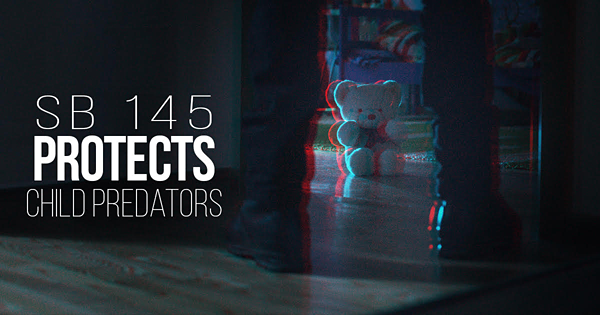
Sacramento - California Democrats have introduced legislation that would place children at risk. Senate Bill 145 would shield a predator that lures a child, for the intent of having sex, from having to automatically register as a sex offender.
FACT SHEET:
Senate Bill 145 – State Senator Scott Wiener (D-San Francisco) and Assemblymember Susan Eggman (D-Stockton)
With their Senate Bill 145, California Democrats Senator Wiener and Assemblymember Eggman state they are trying to shield LGBT young people from having to automatically register as sex offenders for specified sex crimes. But the bill they have introduced does much more than that.
SB 145 would allow a sex offender who lures a minor with the intent to commit a felony (i.e. a sex act) the ability to escape registering as a sex offender as long as the offender is within 10 years of age of the minor. No specification is made as to whether the sexual offender is straight or LGBT.
The issue here is that the author’s press release states the bill is intended to bring parity in who has to register as a sex offender and who doesn’t, stipulating that: “SB 145 does not apply to intercourse of any kind with minors who are age 14 or younger. For those crimes, mandatory sex offender registration will continue to be the case for all forms of intercourse.” But the actual text of the bill goes much further than that.
As written, SB 145 would add a section to the state’s penal code (Section 290.55) stipulating that as long as the offender is “not more than 10 years older than the minor,” they are not automatically mandated to register as a sex offender.
Heterosexual or homosexual sex is not specified, nor is any age limit or range specified (except for existing law that already excludes lewd acts with children under 14). SB 145 would open the door for adults to victimize minors by luring them with the intent to have sex and then shielding the predator from being automatically registered as a sex offender.
For example, under SB 145, a 25-year-old luring a 15-year-old, a 22-year-old luring a 12-year-old, or an 19-year-old luring a 9-year-old would be shielded under the proposed legislation.
In plainer words, certain sexual predators will be able to live among us without our being aware and teens, often the most vulnerable victims of sexual predators, will be even more vulnerable.
ADDITIONAL BACKGROUND:
Because of the manner in which our sexual assault statutes are written there is a difference between heterosexual acts and homosexual ones; we separate different acts by their type: rape, sodomy, oral copulation, penetration by a foreign object, lewd and lascivious conduct, etc. This separation has many benefits but it also has some issues.
SB 145 is not just a bill to bring parity to the LGBT community when it comes to sex offender registration. The actual effect of SB 145 would be to shield predators who lure minors into having sex from having to register as sex offenders. The unintended consequences will leave vulnerable teens unprotected from adults seeking to lure them into being sexually victimized.
* * *
TEXT of Senate Bill 145
An act to add Section 290.55 to the Penal Code, relating to sex offenders.
LEGISLATIVE COUNSEL'S DIGEST
SB 145, as introduced, Wiener. Sex offenders: relief from registration.
Existing law, the Sex Offender Registration Act, amended by Proposition 35, as approved by the voters at the November 6, 2012, statewide general election, requires a person convicted of one of certain crimes, as specified, to register with law enforcement as a sex offender while residing in California or while attending school or working in California, as specified. A willful failure to register, as required by the act, is a misdemeanor or felony, depending on the underlying offense.
This bill would authorize a person convicted of certain offenses involving minors to seek discretionary relief from the duty to register if the person is not more than 10 years older than the minor.
Digest Key – Vote: MAJORITY Appropriation: NO Fiscal Committee: YES Local Program: NO
THE PEOPLE OF THE STATE OF CALIFORNIA DO ENACT AS FOLLOWS:
SECTION 1. Section 290.55 is added to the Penal Code, immediately following Section 290.5, to read:
290.55. (a) A person convicted of an offense specified in subdivision (b) may, by writ of mandate, seek discretionary relief from the duty, imposed as a result of that conviction, to register pursuant to the act if, at the time of the offense, the person is not more than 10 years older than the minor, as measured from the minor’s date of birth to the person’s date of birth.
(b) This section applies to the offenses described in subdivision (b) of Section 286, subdivision (b) of Section 287, Section 288.3, and subdivisions (h) and (i) of Section 289.
http://leginfo.legislature.ca.gov/faces/billNavClient.xhtml?bill_id=201920200SB145
* * *
CA Penal Code § 288.3 (2017)
(a) Every person who contacts or communicates with a minor, or attempts to contact or communicate with a minor, who knows or reasonably should know that the person is a minor, with intent to commit an offense specified in Section 207, 209, 261, 264.1, 273a, 286, 287, 288, 288.2, 289, 311.1, 311.2, 311.4 or 311.11, or former Section 288a, involving the minor shall be punished by imprisonment in the state prison for the term prescribed for an attempt to commit the intended offense.
(b) As used in this section, “contacts or communicates with” shall include direct and indirect contact or communication that may be achieved personally or by use of an agent or agency, any print medium, any postal service, a common carrier or communication common carrier, any electronic communications system, or any telecommunications, wire, computer, or radio communications device or system.
(c) A person convicted of a violation of subdivision (a) who has previously been convicted of a violation of subdivision (a) shall be punished by an additional and consecutive term of imprisonment in the state prison for five years.
Penal Code: https://codes.findlaw.com/ca/penal-code/pen-sect-288-3.html
